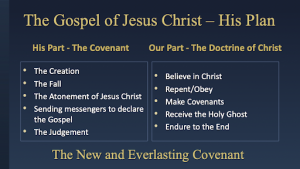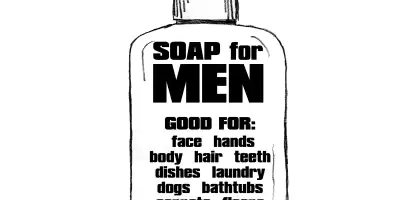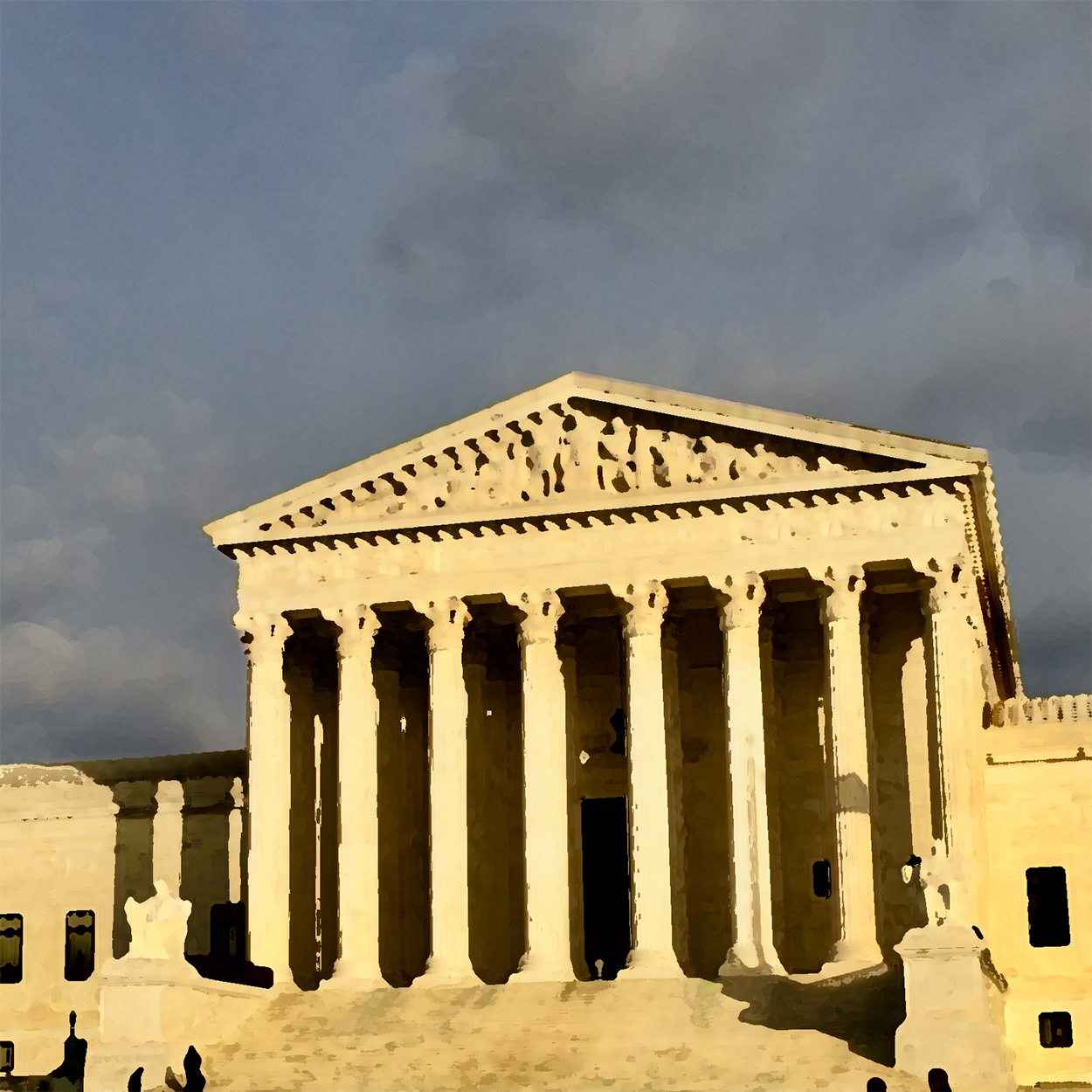Jesus Christ’s Atonement is the core of God’s everlasting covenant with His children. That overarching covenant was made before the foundation of the world in the premortal council in heaven. Despite our inevitable fall, God promised us He would not only ensure a way back to His presence but provide a way that we could be crowned in glory, light, and truth as He is. This is His immutable covenant with His children. Known Christian author James Ferrell put it this way:
“The problem of life—the problem that the whole plan of salvation and redemption was conceived to solve—is how to transform and sanctify beings whose impure hearts, desires, and wills cannot abide the glory of God into beings whose hearts, desires, and wills can abide that glory.”
Similarly, Joseph Smith said:
“God himself, finding he was in the midst of spirits and glory … saw proper to institute laws whereby the rest could have a privilege to advance like himself.”
The plan for our salvation is The Gospel of Jesus Christ–The New and Everlasting Covenant. Not the circles and lines we have so often drawn. I divide the plan into two ‘parts’: His part and our part. Heavenly Father’s part includes the creation, the fall, the Atonement of Jesus Christ, sending messengers to declare the gospel, and the final judgment. Through His part, justice can be perfectly served, and mercy can be abundant, even infinite. At the same time, our agency had to be perfectly preserved. Thus, our part of the plan is founded upon our agentic engagement in the Doctrine of Christ. This includes five simple yet profound principles: faith in Jesus Christ, repentance, making covenants through ordinances that complete our repentance and bind us to God, receiving the gift of the Holy Ghost, and then enduring to the end by repeatedly and iteratively engaging in this process of upward progression. Through the power of Christ’s atonement and by engaging in this process, we can be born again, transformed into beings whose hearts, desires, and wills can abide God’s glory.

Christ’s Atonement is the core of both ‘parts’ of the plan. It is by His infinite and perfect Atonement that He has power to save and exalt. Bruce R McConkie taught:
“The Atonement of Christ embraces, sustains, supports, and gives life and force to all other gospel doctrines. It is the foundation upon which all truth rests.”
William Tyndale, in his life’s work to translate the Bible into English, is given credit for the word ‘atonement.’ It is a concatenation of three words, At-One-Ment. Elder James Talmage defined it as “reconciliation or the bringing into agreement those who have been estranged.” Justice can be perfectly served, and mercy can be abundant.
Merits, Mercy, and Grace
But how do we start to grasp this doctrine? How can we, who are so finite, comprehend and come to some understanding of the infinite? I have been inspired by these words from Lehi to his son Jacob:
Wherefore, redemption cometh in and through the Holy Messiah; for he is full of grace and truth. Behold, he offereth himself a sacrifice for sin, to answer the ends of the law, unto all those who have a broken heart and a contrite spirit; and unto none else can the ends of the law be answered. Wherefore, how great the importance to make these things known unto the inhabitants of the earth, that they may know that there is no flesh that can dwell in the presence of God, save it be through the merits, and mercy, and grace of the Holy Messiah (emphasis added).
These three words—merits, mercy, and grace have helped me to organize my seeking and begin to grasp the infinite and perfect Atonement of Christ.
The Merits—To Restore All That Was Lost in the Fall
I included in the Merits of Christ His power to bring innocence to every child born, providing the “light of truth” to every person, bringing to pass the resurrection of all who will ever live, and restoring them to the presence of God. These elements are vital to the “great plan of our God” and are put in place solely by the merits of Christ. Without them, we could not be judged for our sins; our moral agency would be compromised. We would be victims, as opposed to agents who have the power to act for ourselves. His Atonement broke the bands of spiritual death.
The atonement bringeth to pass the resurrection of the dead; and the resurrection of the dead bringeth back men into the presence of God; and thus they are restored into his presence, to be judged according to their works, according to the law and justice.”
And as Samuel the Lamanite testified, “But behold, the resurrection of Christ redeemeth mankind, yea, even all mankind, and bringeth them back into the presence of the Lord.” This universal power of resurrection and restoration, based solely on the merits of Christ, is vital to the great plan of our God, for without this, we could not be judged for our own sins. Our moral agency would be compromised.
Mercy—To Bring About the Conditions of Repentance
The Mercy of the Holy Messiah is what I see as the redeeming power of Christ’s Atonement, which is often referenced in scripture as the bowels of mercy. This is the blessing most of us think about when we contemplate Christ’s Atonement. It is the blessing that through faith in Christ and sincere repentance, we can be made clean, healed without a scar. But how is it possible that gross sins are completely removed? What are the “conditions of repentance,” as used frequently in the Book of Mormon? How can one man atone for the sins of another? As Amulek declared, “There is not any man that can sacrifice his own blood which will atone for the sins of another. Now if a man murdereth, behold will our law, which is just, take the life of his brother? I say unto you, Nay.”
God cannot simply wave just laws; justice must be fully satisfied. In our world, where everything seems so relative, we need to remember that justice brings order. Without it, chaos reigns. Thus, God cannot and will not rob justice. As Alma declared:
… Now the work of justice could not be destroyed; if so, God would cease to be God … And now, the plan of mercy could not be brought about except an atonement should be made; therefore God himself atoneth for the sins of the world, to bring about the plan of mercy, to appease the demands of justice, that God might be a perfect, just God, and a merciful God also … do ye suppose that mercy can rob justice? I say unto you, Nay; not one whit. If so, God would cease to be God.
Thus, for Christ to pay the price for our sins, He had to satisfy every demand of justice. The scriptures testify that, indeed, He did “answer the ends of the law” and satisfied the demands of justice. There was no suspension of the demands. Christ willingly paid the “uttermost farthing” required of justice.
And behold, this is the whole meaning of the law, every whit pointing to that great and last sacrifice; and that great and last sacrifice will be the Son of God, yea, infinite and eternal. And thus, he shall bring salvation to all those who shall believe on his name; this being the intent of this last sacrifice, to bring about the bowels of mercy, which overpowereth justice, and bringeth about means unto men that they may have faith unto repentance. And thus, mercy can satisfy the demands of justice.
Christ’s perfect Atonement paid the price for every sin, every injustice, every failing that is part of our fallen world. To fully meet the demands of justice, Christ had to satisfy all the requirements of the law, including being sinless, infinite yet mortal, foreordained, sustained, and willing—acting under His own agency—“Here am I send me.” He had to satisfy every demand of justice.
With this “condition of repentance” fully met, it falls to us individually to do our part. That is, to believe and repent and make covenants that witness our intent to follow Him. This requires us to offer the sacrifice that justice demands of us—a broken heart and contrite spirit.
Grace—Power to Become and Overcome
I include in His grace two critical elements of Christ’s atonement. First is His enabling power, which allows us to become partakers of His divine nature. Elder Bednar has taught:
The gospel of the Savior is not simply about avoiding bad in our lives; it also is essentially about doing and becoming good. And the Atonement provides help for us to overcome and avoid bad and to do and become good. There is help from the Savior for the entire journey of life—from bad to good to better and to change our very nature.
This is the power made possible by Christ’s Atonement to literally make us new creatures, to be partakers of His divine nature. To receive a new heart, removing any disposition to do evil and giving us a desire to do good continually. Because of His Grace, we can be fundamentally changed to be like Him. Christ is mighty to change and mighty to heal.
The Atonement also satisfies the debt justice owes to us by healing and compensating us for any suffering we innocently endure. ‘For behold, he suffereth the pains of all men, yea, the pains of every living creature, both men, women, and children, who belong to the family of Adam.’
Because Heavenly Father granted agency to all His children, the pains of mortality are real; the truly innocent suffer at the hands of others. However, Christ still promises His healing, peace, and joy amid the heartache and pain that all suffer because of these conditions. For He has “taken upon him [our] infirmities … that he may know according to the flesh how to succor his people according to their [individual] infirmities.” And in another aspect, as Lehi told His son Jacob, “he shall consecrate thine afflictions for thy gain.” The power of Christ is mighty to change and mighty to heal.
An Invitation
President Russell M Nelson has repeatedly invited us to learn all we can about Jesus Christ and His Atonement. He has also told us that his efforts in this regard have made him “a different man!” A similar invitation was extended nearly 28 years ago by Elder Bruce R McConkie. He said:
Now, the atonement of Christ is the most basic and fundamental doctrine of the gospel, and it is the least understood of all our revealed truths. Many of us have a superficial knowledge and rely upon the Lord and his goodness to see us through the trials and perils of life. But if we are to have faith like Enoch and Elijah, we must believe what they believed, know what they knew, and live as they lived. May I invite you to join with me in gaining a sound and sure knowledge of the Atonement?
These prophetic invitations are not only to increase our understanding of Jesus Christ but to be changed by Him, as President Nelson said he was. That is how gospel truth works. It does not simply inform our minds, but if we receive it through the power of the Holy Ghost, it changes our hearts.
President Uchdorf said:
As ‘we talk of Christ, … rejoice in Christ, … preach of Christ, [and] prophesy of Christ’ at every opportunity, we must never lose our sense of awe and profound gratitude for the eternal sacrifice of the Son of God. The Savior’s Atonement cannot become commonplace in our teaching, in our conversation, or in our hearts.
As we celebrate Christ this Easter season, I pray an increased sense of awe and gratitude will fill our souls. And as The Living Christ states, “God be thanked for the matchless gift of His divine Son.”

















